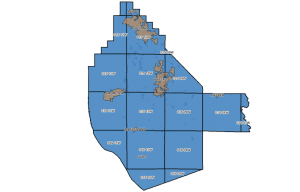New year, new laws
More than 300 new laws took effect Jan. 1, ranging from a ban on book bans to the regulation of “deepfake porn” and prohibitions on videoconferencing while driving.
Thanks to a law signed in 2019, workers at the lowest end of the pay scale will see a pay raise with the new year as the state minimum wage increases by one dollar to $14 per hour.
The law gradually phases in a $15 per hour minimum wage starting in 2025.
The minimum wage applies to most workers 18 years of age and older. Teens who work less than 650 hours in a calendar year will go up to $13 per hour while the minimum wage for tipped workers will increase to $9 an hour.
Also come Jan. 1, Illinoisans who own guns, ammunition and accessories prohibited under the state’s “assault weapons” ban will be in violation of the law if they don’t register them with the state. A federal judge recently chose not to temporarily halt the law’s enforcement while a broader legal challenge plays out. The U.S. Supreme Court also recently declined to stay the law.
While permanent administrative rules regulating which guns and ammunition must be registered with the Illinois State Police remain in flux, temporary rules governing registration remain in effect.
Other laws hitting the books include a measure granting paid leave to all workers, indoor vaping restrictions and a ban on youth solitary confinement in state correctional facilities, among others.
Paid leave for all
Starting Jan. 1, anyone who works in Illinois is entitled to earn up to 40 hours of paid leave during a 12-month period, time they can take off work for any reason, regardless of whether they are full-time, part-time, or seasonal employees.
The Paid Leave for All Workers Act passed during the lame duck session in January – a session that was called primarily to pass the assault weapons ban. Gov. JB Pritzker signed it into law March 13.
“That is a game changer for many employers, particularly those who have not previously offered any type of paid leave to their employees,” Scott Cruz, a labor attorney, told Capitol News Illinois in November.
In particular, he said, the law will be a major change for waiters, waitresses and other workers in the hospitality industry who have never received paid leave benefits in the past.
Municipalities are not exempt from the law, and the Monroe County Board of Commissioners and Columbia City Council each recently passed ordinances establishing paid leave regulations to fully comply with the law. Both had already offered a greater amount of paid leave prior to passing new ordinances but needed to make minor changes prior to Jan. 1.
The Illinois Department of Labor has published a list of frequently asked questions to help guide employers and employees through the new law.
Banning book bans
Libraries in Illinois will lose access to grants administered by the secretary of state’s office after Jan. 1 if they ban books or other material “because of partisan or doctrinal disapproval.”
The so-called ban on book bans, House Bill 2789, was an initiative of Secretary of State Alexi Giannoulias. The secretary of state in Illinois also serves as state librarian, which awards millions of dollars a year in grants to public and school libraries throughout the state.
Under the new law, libraries must either adopt the American Library Association’s Library Bill of Rights or develop a written statement prohibiting the practice of banning specific books or resources.
Giannoulias said he proposed the legislation after extremist groups targeted Illinois libraries with efforts to ban certain materials from circulation.
“The concept of banning books contradicts the very essence of what our country stands for,” he said in a statement. “It also defies what education is all about: teaching our children to think for themselves. This landmark law is a triumph for our democracy, a win for First Amendment rights and a great victory for future generations.”
Digital forgeries
Lawmakers this spring approved a new protection for victims of “deepfake porn.” Starting in 2024, people who are falsely depicted in sexually explicit images or videos will be able to sue the creator of that material.
The law is an amendment to the state’s existing protections for victims of “revenge porn,” which went into effect in 2015.
In recent years, deepfakes – images and videos that falsely depict someone – have become more sophisticated with the advent of more readily available artificial intelligence tools. Women are disproportionately the subject of this AI deepfake porn.
Some sponsors of the legislation have indicated interest in further regulating the use of AI in the near future.
Zooming while driving
Starting on Jan. 1, it is illegal for Illinois drivers to participate in videoconferencing or check social media pages while behind the wheel.
The law adds the use of any mobile videoconferencing software, explicitly referencing Zoom, Microsoft Teams and Webex, to banned actions under existed distracted driving laws.
The law also specifically names social media sites Facebook, Snapchat, Instagram and “Twitter,” which was rebranded to X a few months after the law’s passage.
Illinois law currently bans cell phone use generally while driving, although it does allow drivers to use phones through hands-free or voice-activated means. In 2022, more than 24,000 drivers were cited for distracted driving in Illinois, according to the secretary of state’s office.
Illinois drivers continue to be able to use cell phones in handheld mode if they are reporting an emergency, are parked on a road’s shoulder or if they are stopped due to a traffic obstruction and the vehicle is in neutral or park.
Vaping indoors
People who use electronic cigarettes or vaping devices now face the same restrictions as cigarette smokers.
It’s an update to the state’s Smoke-Free Illinois Act, which banned smoking in most indoor public spaces and within 15 feet of building entrances in 2008. “Public places” include restaurants, theaters, offices, stores, libraries, schools, polling places, all government-owned buildings and banks, among others.
Tobacco stores and vape shops are exempt from the law, as well as some other facilities, such as smoking rooms in nursing homes, some hotel rooms and tobacco conventions.
The U.S. Centers for Disease Control and Prevention reported that in 2021, nearly 5 percent of adults were e-cigarette users – although that figure was 11 percent among people ages 18-24.
Other new laws
House Bill 2503 allows any person who requires a course not offered by their local community college to take that course at another community college and pay in-district fees and tuitions.
Senate Bill 50 requires all new single-family homes and multi-family buildings built in Illinois to include EV-capable parking. The infrastructure for an electric panel capacity and conduit needed for charging must be installed, but installation of an EV charger is not required.
House Bill 3140 prohibits solitary confinement in youth detention facilities for any purpose other than temporarily preventing serious and immediate risk of physical harm.
Senate Bill 850 created a grocery initiative program which will receive $20 million to fund grants and financial aid to grocery stores opening or operating in “food deserts.” It also requires the Department of Commerce and Economic Opportunity to study food deserts.
House Bill 1541 prohibits utilities from shutting off gas or electric services due to non-payment of bills when the temperature exceeds 90 degrees or there is a heat advisory in effect.
It’s long been illegal in Illinois to hang an object that obstructs a driver’s view from a rearview mirror. House Bill 2389 maintains that driving with such an obstruction is prohibited, but it also prevents law enforcement from stopping and searching a vehicle solely because the driver is violating that law.
Under Senate Bill 1817, anyone who considers immigration status during a real estate transaction, including purchase and rental transactions, could be guilty of a civil rights violation.
House Bill 3924 requires high schools to teach students about the dangers of fentanyl in state-required health courses. The coursework would include differentiating legal and illegal uses of the drug, details about “the process of lacing fentanyl in other drugs and why drugs get laced with fentanyl,” as well as information on how to detect fentanyl in drugs and how to save someone from an overdose.
House Bill 3203 allows pharmacists and retailers to sell fentanyl test strips over the counter.
House Bill 3491 allows any laborer, worker or mechanic employed by a contractor or subcontractor who is paid in a sum less than the prevailing wage rate for work performed on a project the right to legal action for whatever difference in salary there may be.
House Bill 3396 prohibits any person to act with the intent of interfering with, obstructing, or impeding a picket line or other demonstrations or protests, or placing any object in the public way for such purpose. The bill makes any such action a Class A misdemeanor with a minimum fine of $500.
The Illinois Department of Public Health and Department of Children and Family Services are required, at the request of local health departments, to make any and all public health data related to residents of that jurisdiction available for purposes of preventing or controlling disease, injury or disability.
Senate Bill 1463 prohibits fees and fines from being assessed in Illinois to individuals under the age of 18, except for traffic tickets, boating or fishing violations, or municipal ordinance violations.
House Bill 1155 allows any person, surviving spouse or next of kin for any person who is injured or killed by a person under the age of 18 who is impaired by drugs or alcohol to pursue legal damages from a person who willfully supplied or willfully allowed consumption of drugs or alcohol to the minor in question.
House Bill 2500 prohibits animal control facilities from charging an adoption fee for dogs or cats if the person presents a valid ID with the word “veteran” printed on its face.
Senate Bill 1883 prohibits keepers of bears and nonhuman primates from allowing members of the general public to come into contact with them. Violators of the law would be subject to a Class B misdemeanor. “General public” does not include employees at the facility where the animal is kept, veterinarians or professional film crews.






